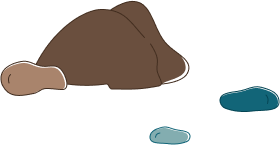The lexicon uses trauma-informed vocabulary to understand the impacts of ILR practice on body, mind, and spirit.
Explore the lexicon by moving outward from wellbeing into other trauma-informed vocabulary for your ILR practice.
I built this lexicon by drawing on my personal experience using trauma-informed practices. To read more about my experience using trauma-informed practices check out this paper.
Click an item to learn more.
Why does trauma-informed vocabulary matter?
As an ILR practitioner you work on the frontline of colonization and intergenerational trauma’s impact on Indigenous communities.
Trauma-informed vocabulary acknowledges that the stressors of colonization and intergenerational trauma are systemic, structural, and ongoing.
These stressors take a toll upon your body, mind, and spirit.
Learning to observe the impact of colonization’s stressors helps you understand how to better protect, nurture, and sustain your wellbeing.
What does trauma-informed vocabulary help you do?
As an ILR practitioner you need words, concepts, and ways of looking at Indigenous language revitalization that:
Understanding your stress cycle is also essential to preventing burnout within your ILR practice.
Journaling and Reflection Exercises
Write down in a journal your reflections on these questions.


